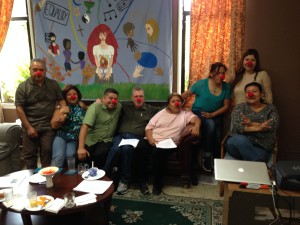 At Fools Mission , the fool represents both the freedom to speak truth to power and the role of art in shifting human consciousness and culture. The fool levels the playing field as we bring people together across boundaries of language, culture, and social class. It is hard to feel superior or inferior when everyone in the room is wearing a red clown nose or foolscap. It’s difficult to revert to the identity politics of tribe, nationality, ethnicity, race, citizenship status, or educational accomplishment when everyone is capable of laughing at their own inner foolishness. The fool is keenly aware of the limitations of human knowledge, so detachment from the concerns of the ego is an essential part of our spiritual practice. We seek to balance each action that we take with reflection on the experience. As we engage in our praxis, each of us becomes both a teacher and a student. Action without reflection is reckless; and reflection without action is meaningless.
At Fools Mission , the fool represents both the freedom to speak truth to power and the role of art in shifting human consciousness and culture. The fool levels the playing field as we bring people together across boundaries of language, culture, and social class. It is hard to feel superior or inferior when everyone in the room is wearing a red clown nose or foolscap. It’s difficult to revert to the identity politics of tribe, nationality, ethnicity, race, citizenship status, or educational accomplishment when everyone is capable of laughing at their own inner foolishness. The fool is keenly aware of the limitations of human knowledge, so detachment from the concerns of the ego is an essential part of our spiritual practice. We seek to balance each action that we take with reflection on the experience. As we engage in our praxis, each of us becomes both a teacher and a student. Action without reflection is reckless; and reflection without action is meaningless.
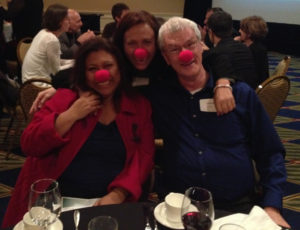 This shared identity is part whimsy, part insight. Like many groups that have shifted a once-pejorative term into a term of endearment, we mine the richness of the archetype for deeper meaning. You can forgive a fool for making a mistake—an essential component of multicultural engagement. The fool recognizes the personal strength and healing that art can provide, which feeds our music and theatre programs.
This shared identity is part whimsy, part insight. Like many groups that have shifted a once-pejorative term into a term of endearment, we mine the richness of the archetype for deeper meaning. You can forgive a fool for making a mistake—an essential component of multicultural engagement. The fool recognizes the personal strength and healing that art can provide, which feeds our music and theatre programs.
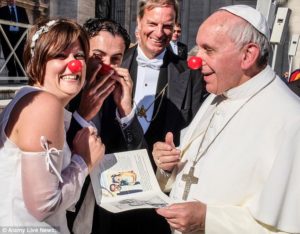 One of the most helpful insights we’ve had is that a fool enters a relationship to be transformed by the relationship oneself, rather than to “fix” others. The humility inherent in this stance enables us to emphasize service and minimize judgement. Even people who think that undocumented immigrants should go back where they came from, or that the poor deserve their fate, hold opinions that are shared by millions. Paraphrasing Pope Francis, “Who are we to judge?” Fools are here to embody the power of love in this world, not to mold the world in our image.
One of the most helpful insights we’ve had is that a fool enters a relationship to be transformed by the relationship oneself, rather than to “fix” others. The humility inherent in this stance enables us to emphasize service and minimize judgement. Even people who think that undocumented immigrants should go back where they came from, or that the poor deserve their fate, hold opinions that are shared by millions. Paraphrasing Pope Francis, “Who are we to judge?” Fools are here to embody the power of love in this world, not to mold the world in our image.
The archetype of the fool has revealed itself in story, myth, and culture down through the ages. The stories of indigenous peoples about “Trickster” characters who can steal the bait without tripping the trap—such as coyote, raven, or rabbit—form our earliest preserved memories of the tradition.
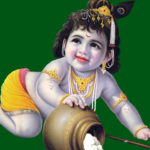 Trickster continues to appear in mythology wherever there is a need for artists to disrupt decaying or paralyzed cultures. The West African divination god Eshu leaves open the possibility of randomness and chance. In Indian mythology, the young Lord Krishna steals butter from his mother’s larder long before he begins to sing and play the flute to lure out the women of the village.
Trickster continues to appear in mythology wherever there is a need for artists to disrupt decaying or paralyzed cultures. The West African divination god Eshu leaves open the possibility of randomness and chance. In Indian mythology, the young Lord Krishna steals butter from his mother’s larder long before he begins to sing and play the flute to lure out the women of the village.

The Greek god Hermes steals Apollo’s cattle at nine hours old, providing plausible deniability until his singing at a council of the gods pleases Apollo and reunites Hermes with the community. Cultural critic Lewis Hyde points to Frederick Douglass, Pablo Picasso, Allen Ginsberg, and John Cage as prototypical fools in his classic study, Trickster Makes This World.
The fool appears in many guises. In the first card of the Tarot deck, the fool is typically portrayed as a wayward pilgrim with a knapsack, always in the moment, blissfully unaware that he is about to fall off the edge of a cliff. In Zoroastrian mysticism, the fool and the magician together represent divine consciousness becoming aware of itself.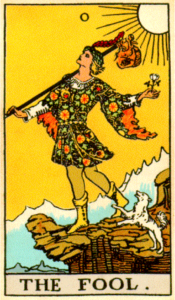
The Apostle Paul says, “If any of you thinks that you are wise in the eyes of this age, you will have to become foolish, before you can become truly wise. Because what this world counts as wisdom is folly in the eyes of God.” At the center of Pauline theology was the notion that God is found in an executed criminal instead of the Roman Emperor—a divine expression of “power in weakness and defeat” that was “foolishness to Greeks and offensive to Jews.”
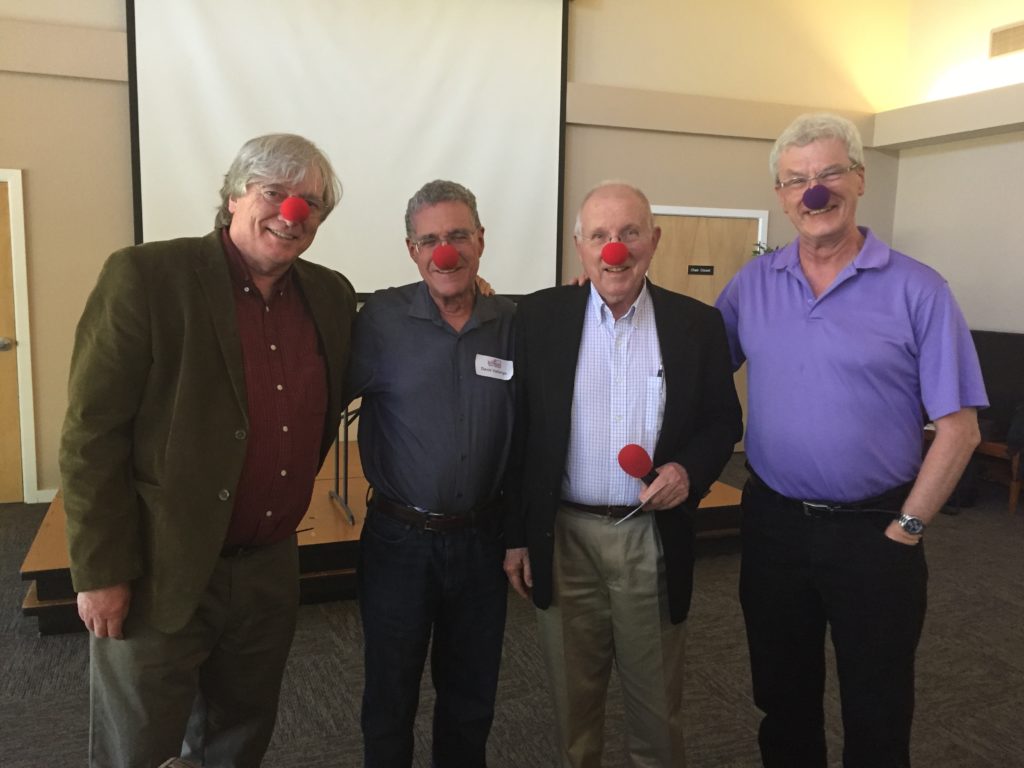
Fools David Vallerga and Thomas Atwood put on the nose with Arthur Dewey and Brandon Scott, scholars of the Jesus Seminar, at a seminar in Cupertino, California on “What Paul Really Meant.”
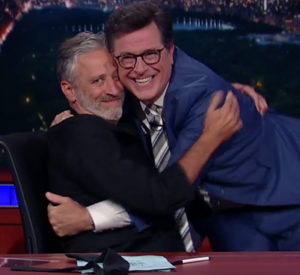 The medieval fool of Shakespeare is renowned for his ability to speak truth to power. In Integral Theology, the consciousness of the Holy Jester or Fool has the capacity to identify, observe, and reflect on all stages of consciousness and their interplay across systems. To this day, national fools like Jon Stewart, John Oliver, and Stephen Colbert open windows of perception by provoking laughter in the body politic.
The medieval fool of Shakespeare is renowned for his ability to speak truth to power. In Integral Theology, the consciousness of the Holy Jester or Fool has the capacity to identify, observe, and reflect on all stages of consciousness and their interplay across systems. To this day, national fools like Jon Stewart, John Oliver, and Stephen Colbert open windows of perception by provoking laughter in the body politic.
